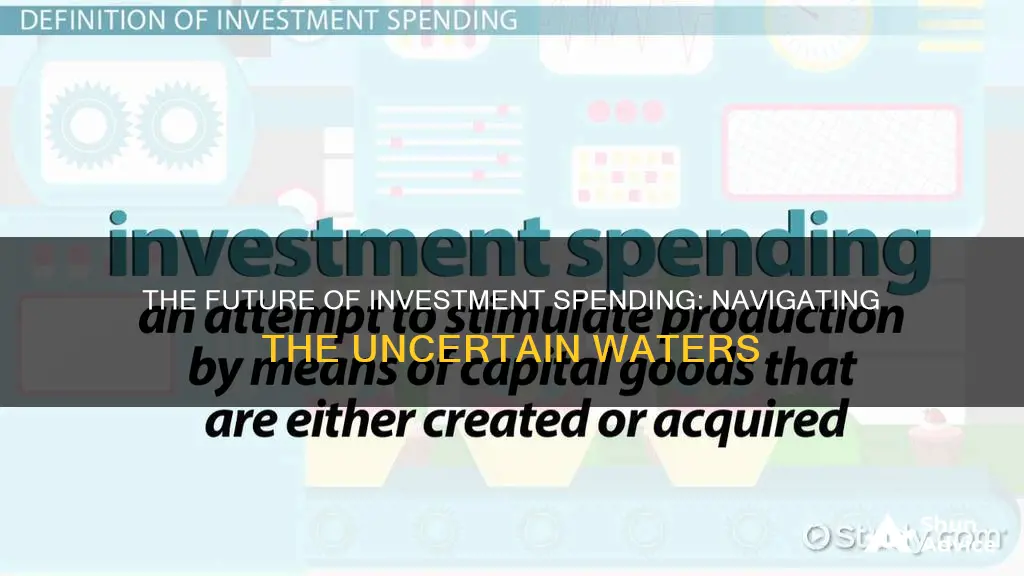
Planned investment spending is the amount of money firms intend to invest during a given period. It is a major driver of business cycles and can be influenced by various factors, including interest rates, expected real GDP growth, and current production capacity. Changes in planned investment spending can have significant effects on the economy, with lower interest rates generally encouraging businesses to increase their investment spending, while higher interest rates may lead to decreased spending. Additionally, government policies, such as environmental regulations or changes in taxation, can also impact planned investment spending.
| Characteristics | Values |
|---|---|
| What is planned investment spending? | The investment spending that businesses intend to undertake during a given period |
| What are the three principal factors that planned investment spending depends on? | The interest rate, the expected future level of real GDP, and the current level of production capacity |
| What is the impact of lower interest rates on planned investment spending? | Lower interest rates make borrowing cheaper for businesses, encouraging them to increase their planned investment spending |
| What is the impact of higher interest rates on planned investment spending? | Higher interest rates make borrowing more expensive for businesses, leading to reduced planned investment spending |
| How does the expected future level of real GDP affect planned investment spending? | If companies expect rapid real GDP growth, they will anticipate rapid sales growth, resulting in increased planned investment spending |
| How does the current level of production capacity influence planned investment spending? | Higher expected sales coupled with lower current capacity lead to increased planned investment spending to meet future demand |
What You'll Learn

Interest rates fall due to Federal Reserve policy
Interest rates play a pivotal role in shaping the economic landscape, and the Federal Reserve's monetary policy decisions, including interest rate adjustments, are a key lever in this regard. When the Federal Reserve lowers interest rates, it sets off a chain of events that influence consumers, businesses, and the overall economy. Here's how interest rates falling due to Federal Reserve policy can lead to changes in planned investment spending:
Impact on Consumers
Consumer behaviour is sensitive to interest rate movements. When the Federal Reserve lowers interest rates, borrowing costs for consumers decrease. This makes it more affordable for individuals to take out loans for significant purchases, such as homes or vehicles. Lower interest rates also make it more appealing for consumers to borrow money for other purposes, such as credit card usage or store credit. As a result, consumers may be more inclined to spend and invest in big-ticket items, which can stimulate the economy.
Impact on Businesses
Lower interest rates benefit businesses by reducing their borrowing costs. Businesses can take advantage of this situation to invest in expansion projects, purchase new equipment, or finance research and development initiatives. Additionally, lower interest rates can encourage businesses to borrow money for operational purposes, such as hiring additional staff or increasing production. This increased business investment can have a positive impact on the economy, creating a ripple effect of economic growth.
Monetary Policy and the Economy
The Federal Reserve adjusts interest rates as part of its monetary policy to maintain economic stability and healthy growth. During an economic downturn, the Federal Reserve may lower interest rates to encourage investment and spending, providing a boost to the economy. However, it's a delicate balancing act, as excessively low-interest rates can lead to an overheated economy, causing product and labour shortages, and ultimately resulting in inflation. Therefore, the Federal Reserve must carefully time and calibrate its interest rate decisions to achieve the desired economic outcomes.
In summary, a decrease in interest rates due to Federal Reserve policy can stimulate planned investment spending by making borrowing more affordable for both consumers and businesses. This increased investment and spending have positive ripple effects throughout the economy. However, the Federal Reserve must also be mindful of the potential for inflation and make policy decisions accordingly.
Investing in Innovation: Turning Ideas into Reality
You may want to see also

EPA decree to upgrade or replace machinery to reduce emissions
The EPA has been taking steps to reduce emissions from various sources, including vehicles, heavy equipment, and locomotives. In December 2021, the EPA announced the most ambitious federal greenhouse gas emissions standards for passenger cars and light trucks ever, which are expected to reduce billions of tons of climate pollution and improve public health. The EPA has also provided grant funding through the Diesel Emissions Reduction Act (DERA) program to reduce emissions from older diesel engines, with a focus on communities with poor air quality.
In January 2023, Genesee & Wyoming (G&W) entered into a consent decree with the US Justice Department and the EPA, agreeing to disable or upgrade over 70 locomotives to meet Tier 3 or 4 emission standards. This decree allows G&W to either scrap the locomotives or install replacement engines that meet the required emission standards.
The EPA has also proposed and finalized more ambitious standards to reduce harmful air pollutant emissions from light-duty and medium-duty vehicles for model years 2027 and later. These standards build upon the previous emissions standards for model years 2023-2026 and aim to improve public health, reduce climate pollution, and save drivers money.
To comply with these EPA decrees and standards, businesses and organizations may need to upgrade or replace their machinery and equipment, which can involve significant investment spending. This investment in upgraded or replaced machinery will help reduce emissions and improve air quality, public health, and the environment.
Unlocking Executive Retirement: Exploring the Supplemental Executive Retirement Plan Advantage
You may want to see also

Baby boomers retire, leading to higher interest rates
As baby boomers—the generation born between 1945 or 1946 and 1964—retire in large numbers, there are concerns about how this will affect interest rates. This demographic cohort has been shaping the US economy for seven decades, and their mass retirement will have wide-ranging effects.
Firstly, as more baby boomers leave the workforce, there will be fewer workers contributing taxes to social programs such as Social Security. This will deplete the Social Security trust fund, as fewer workers will be paying into it, while a growing number of retirees draw from it. This could put pressure on the economy and potentially lead to higher taxes to support these programs.
Secondly, the retirement of baby boomers will impact consumer spending. Retirees tend to spend and consume less, which could negatively affect economic growth. This decrease in consumer spending will particularly affect the transportation, utilities, wholesale trade, and real estate sectors.
Additionally, the retirement of baby boomers may contribute to higher interest rates. With fewer people working and contributing to the economy, there may be a decrease in the supply of goods and services. This imbalance between demand and supply could lead to inflationary pressures, requiring the Federal Reserve to take aggressive action to reduce demand and bring inflation under control. Such actions could include raising interest rates to discourage borrowing and spending, leading to a more severe economic downturn than otherwise expected.
Moreover, the baby boomer generation is one of the largest in history, and the generations following them are smaller. This shift in the "dependency ratio" of those working to those not working can further strain the economy and impact interest rates.
Finally, the impact of baby boomer retirements on interest rates may be influenced by their level of retirement preparedness. Studies suggest that a significant portion of baby boomers are not financially prepared for retirement and will rely primarily on Social Security for income. This lack of retirement savings could further exacerbate the issues mentioned above and potentially lead to higher interest rates as the government and Federal Reserve navigate the economic challenges posed by the mass retirement of baby boomers.
Retirement Investment Strategies: Navigating Your Savings Options
You may want to see also

Changes in business expectations
Economic conditions and global events can also play a significant role in shaping business expectations. For example, during the COVID-19 pandemic, many companies anticipated a decrease in demand and reduced their production levels, which had a ripple effect on the overall economy.
Business expectations are crucial in determining the future prospects of an economy. They can influence investment decisions, hiring plans, and even consumer behaviour. For instance, if businesses expect the economy to grow, they may increase their investment in new projects, research and development, or expansion. This increased spending can stimulate economic growth and further boost consumer confidence, creating a positive cycle.
On the other hand, if businesses are pessimistic about the future, they may cut back on investment and spending, leading to a decrease in aggregate demand and potentially resulting in an economic slowdown or recession. This negative outlook can also impact consumer behaviour, with consumers becoming more cautious about their spending.
Additionally, businesses should be prepared to adjust their strategies and expectations due to changing market conditions and external factors, such as technological advancements. For example, the emergence of e-commerce has provided new opportunities for businesses to sell their products online, while automation has disrupted existing businesses, leading to a decrease in production and demand in certain industries.
In summary, changes in business expectations are influenced by a variety of factors and can have a significant impact on the economy. Businesses that effectively manage their expectations, stay informed about economic trends, and adapt to changing conditions will be better positioned for long-term growth and success.
Club Members: Cramer's Investing Army
You may want to see also

Government spending
Secondly, government spending can have a "ripple effect" on the economy, as outlined by the aggregate expenditures model. An increase in government spending can lead to greater production, which generates additional income for households. This, in turn, can induce further consumption, creating a cycle of increased economic activity. The magnitude of this ripple effect is captured by the concept of the multiplier, which suggests that a change in autonomous aggregate expenditures will result in a multiplied change in equilibrium real GDP.
Additionally, different types of government spending have varying "fiscal multipliers", meaning they affect the economy differently. For instance, cash transfers to households may have a more immediate impact on boosting spending, while investments in infrastructure or education may have longer-term effects by raising productivity.
Furthermore, government spending can be counter-cyclical, meaning it can be used to stimulate the economy during recessions. For example, the Kennedy administration's tax cuts in the 1960s were proposed as a form of expansionary fiscal policy to boost the economy during a recession.
Lastly, interest rates play a crucial role in determining the impact of government spending. Lower interest rates reduce borrowing costs for businesses, making it more affordable to finance investment projects. This can encourage businesses to increase their planned investment spending.
Greece: An Uncertain Investment Climate
You may want to see also
Frequently asked questions
A decrease in interest rates due to Federal Reserve policy will lower borrowing costs for businesses, encouraging them to increase their planned investment spending.
EPA regulations requiring machinery upgrades to reduce emissions will likely lead to an increase in planned investment spending as companies invest in compliance.
Higher interest rates resulting from retiring baby boomers and decreased savings can lead to a decrease in planned investment spending as businesses face higher borrowing costs.







